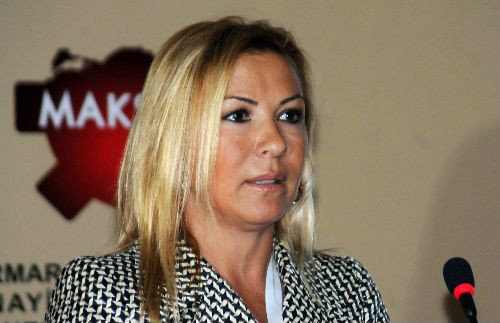Is Ak Parti Becoming More Dominant?
In the deputy elections held in Turkey on June 2th 2011 AK PARTI has shown that it has made progress again on the way to becoming the dominant power in the country. To the surprise of many experts it has won almost 50% of the votes – although it was certain that it would be the winner of the competition, in any case.
Within this framework experts have been trying to find out about the reasons behind this great success. Down below is an interview with an expert about this issue:
Turkey is increasingly moving toward a “dominant-party system” after the government’s stunning electoral victory last week in which it gained new voters and conquered new ground, according to a leading political scientist.
The ruling Justice and Development Party, or AKP’s, hold victory left many dazzled – in contrast to past elections where the party’s wins worried many that the country was sliding toward conservatism. This time, however, a robust economy lies at the heart of the AKP’s victory, said Ali Çarkoğlu, an expert on voting behavior.
Moving its bases of support from the east to the west, where there are more voters, the AKP has become country’s “dominant party,” outscoring its closest rival by a two-to-one margin, Çarkoğlu told the Hürriyet Daily News in an interview this week.
Q: There is an ongoing debate on which party won and which party lost in the elections. What’s your take as a political scientist?
This election was a very significant one for a number of reasons. The volatility in Turkish preferences has considerably decreased. The largest vote getter is the AKP. But its votes increased only by 3 percent, which is not a substantial increase. Of course the fact that the AKP has held onto its previous votes is an achievement and that it managed to increase its vote is a greater achievement.
The left for a second time in a row has increased its share of the vote. A new left is in the making despite all its problems. The CHP [Republican People’s Party] increased its votes 5 percent, and compared to other parties, it has increased its vote share twice as much. This is significant in the absence of a fertile ground for the Turkish left to build its electoral power. When we look at the left/right scale, 18-19 percent is left of center, and of that, 7 percent is extreme left, which is unlikely to vote for the CHP.
On this basis, the CHP could only get 12-13 percent of the electorate that consider themselves on the left. This means they started to appeal to centrist voters. This is a new phenomenon, a new beginning for CHP. But of course, there can be an end to this new beginning if uneasiness on the part of the opponents within the party derails the current administration. I see in this a modest but potentially significant success story.
Another peculiarity of these elections is the disappearance of smaller parties. They basically evaporated into thin air. They used to get around 8 or 9 percent of the vote. The small amount of votes received by Felicity Party and [The People’s Voice Party, or HSP] means the total elimination of the old guard of [the Nationalist View] after 14 years following Feb. 28, 1997 [post-modern coup, in which the army issued a statement that effectively forced the Islamist Welfare Party, or RP, from power]. Electorally speaking, they no longer exist.
The phenomenal success of the Peace and Democracy Party [BDP] is also a peculiarity of this election. For the second time in a row, the independents increased their votes. That suggests the extreme left, together with an ethnic party, is a force to be reckoned with in Turkey. Since 1965, the socialist left was not able to get into Parliament. This is a potentially good development, since we know from past experience that socialists can be quite effective in Parliament.
Q: You call your observations peculiarities? Why is that?
A: The AKP was expected to win, but it is still a peculiarity that they not only held onto power but [also] increased their votes. The BDP won an uphill battle; they got more parliamentarians than they were expecting. Another peculiarity is the fact that the MHP [Nationalist Movement Party] made it into Parliament, despite the fact that 10 of its top administrators resigned due to sex scandals. An electorate that is known to be conservative has rewarded a party tarnished by sex scandals; that is a peculiarity ‘a la turca.’ But the absence of Turkish nationalists in the Parliament, where the BDP is present, would have created a representational disaster. Ninety-five percent of Turkish voters are represented in the Parliament. This means this Parliament will have no problem of representation when it comes to drafting the Constitution.
Q: What are the other peculiarities?
One other peculiarity is about the geographic pattern that emerged. There has been an onward east to west movement from the AKP. It reached the Aegean Sea. The AKP [had] uniform success over many [regions]; this homogeneous increase of their vote share pushed their competitors to the western corners of the country. The west is where the votes are. The AKP gained considerable ground in these provinces. The consolidation of the AKP’s electoral power has not stopped and they are expanding and winning new ground.
If we take an “average Turk” – 30 years old, male, eight years of education with a modest household income and average religiosity – the probability for that person voting for the AKP in 2007, with the worst possible economic performance evaluations, was about 49 percent. In 2010 it was 66 percent and now it is about 75 percent. That tells us how successful the election campaign was. The economy was not that bright last year but the AKP has convinced [people] that they have done a good job and that they will continue to do a good job.
Q: So is the economy the major factor behind AKP’s success, with ideology having played a lesser role?
A: We can’t explain election results with a single factor. After all, the economy and ideology affect each other. Right wingers always tend to be optimistic on the economy while left wingers tend to be pessimistic. But evidence to the fact that ideology played a secondary role is the fact that the 50 percent that voted for the AKP cannot all be right wingers. The AKP appealed to all sorts of people in the ideological spectrum.
Q: You say there is very little volatility in Turkish party system. What does that tell us?
A: This means the consolidation of a new system, which we call the dominant party system. One party consistently obtains twice as much as the … runner up. [If] you add [together] the two runners up, they don’t [even] make up the total sum up of the AKP’s votes. That’s a typical dominant-party system.
Q: This might increase fears that the authoritarian signs shown by Prime Minister Recep Tayyip Erdoğan might strengthen, leading to an authoritarian regime.
A: I don’t particularly see why the dominant-party system should turn into an authoritarian regime. At least in the academic sphere, we see no such trend in the modern examples of such systems in Japan and India, for example. But as the Parliament is set to rewrite the Constitution, I would be worried if the dominant party might be tempted to impose its own preferences on the Constitution. Although it is below the 330 margin that would enable it to seek a referendum, it might still find five or six parliamentarians to pass that [threshold]. But there should be an implicit understanding that the Constitution should not be sought by a simple majoritarian vote.
Pros, cons accompany ‘dominant-party system’
The emergence of the “dominant-party system” in Turkey suggests that government’s performance is quite good as they would not have been able to rule for so long otherwise, according to political scientist Ali Çarkoğlu.
Still, the dominant party system, in which one party consolidates power as it wins twice as much as the opposition, is that it becomes so strong that competition between parties is replaced by competition between leading cadres within the party.
“The [ruling Justice and Development Party] AKP is not a mature party. It has not yet lost an election and has not faced a leadership crisis,” Çarkoğlu told the Hürriyet Daily News.
Although dominant parties become ossified in the long run in terms of its leading cadres, Çarkoğlu noted that the AKP had changed a significant number of its deputies.
The conservative tide seems to be receding back toward the center, said Çarkoğlu, adding that in the long run, economic performance would determine the success of AKP.
As it is very difficult to almost equally distribute more than 2 million votes among independent candidates, he also said the pro-Kurdish Peace and Democracy Party, or BDP, was remarkably successful in its effective mobilization of its supporters and disciplined voting behavior.
“The BDP is here to stay and it might start pushing for issues that go beyond ethnic issues, which could challenge other parties,” he said.
Çarkoğlu also said many educated people voted for the CHP, but added that he did not believe the party was one of elites. “We simply don’t have more than 10 million elite [people].”
June 17, 2011
BARÇIN YİNANÇ
SOURCE: Hürriyet Daily News





